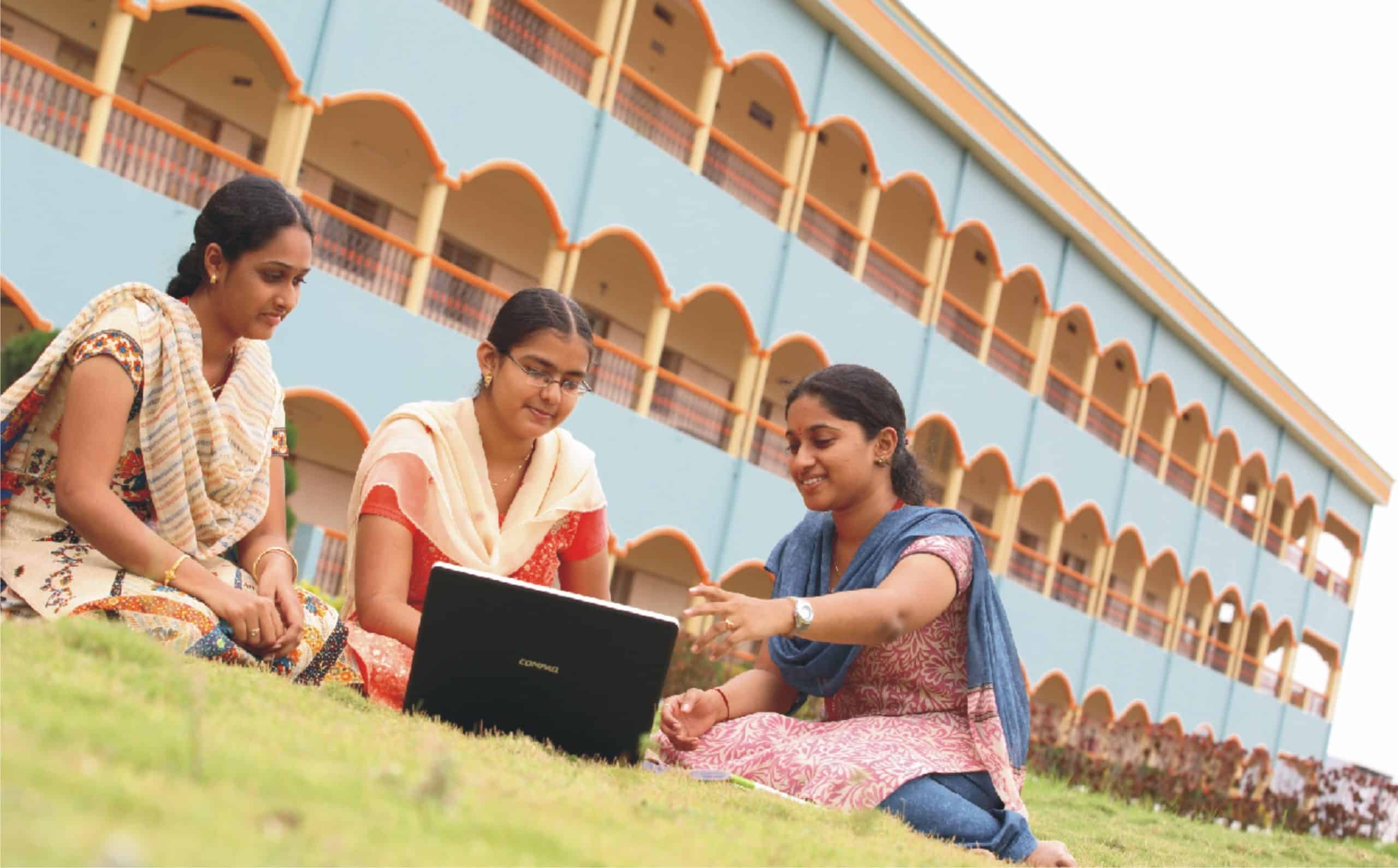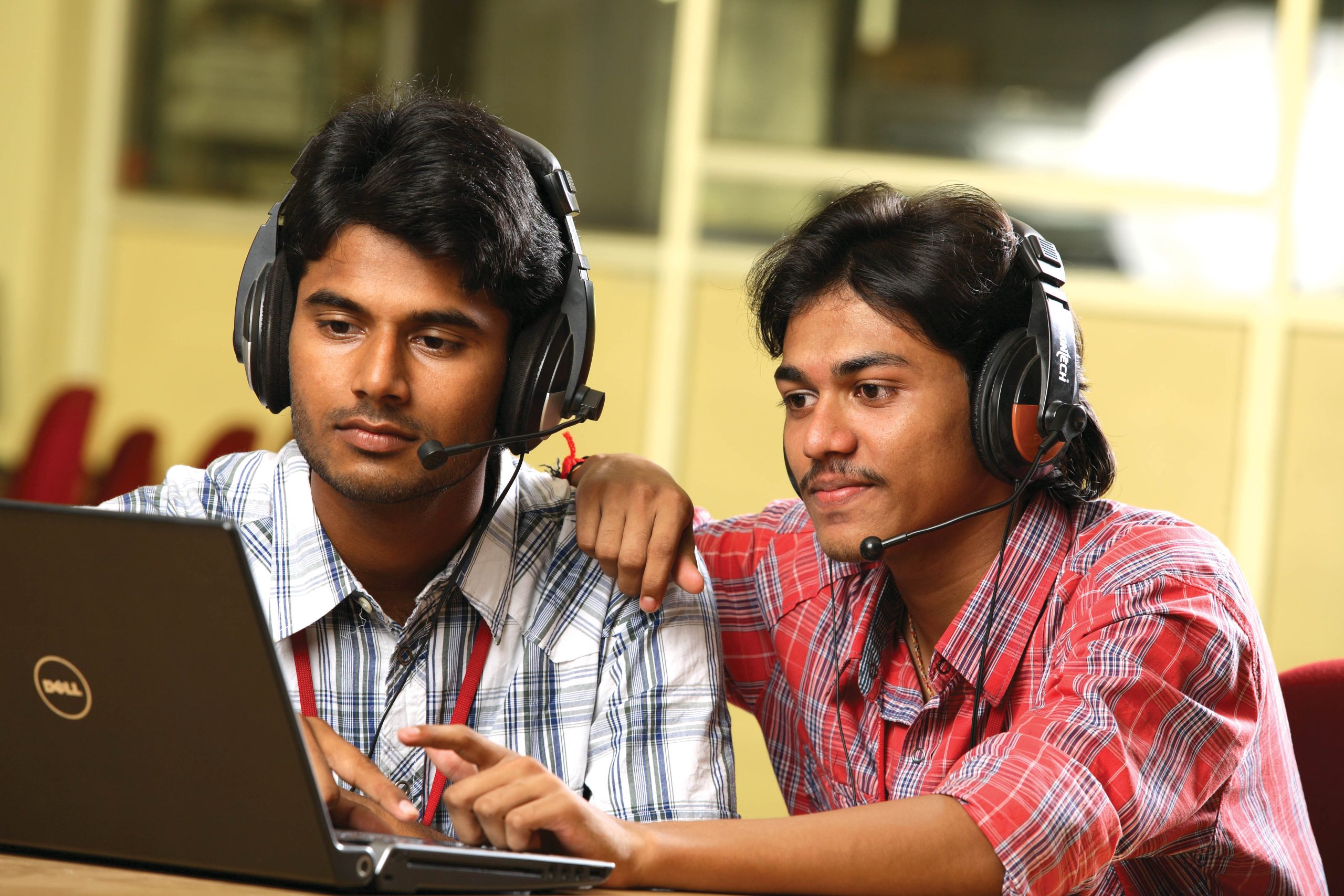COMPUTER SCIENCE ENGINEERING Uses principles from Computer Science and Electrical Engineering that embodies the science and technology of design widely viewed as “designing computers.”
ABOUT THE DEPARTMENT
- From a modest beginning in 2001, the Computer Science Department in St. Ann’s College of Engineering & Technology (SACET), Chirala has now grown into a fully integrated department in the field of Engineering and Technology. It is an “education with future”. Learning how to inquire, converse and collaborate, the skill that never go out of date. The objectives of imparting education, combined with creation, dissemination and application of knowledge are being met in an integrated form to create a synergetic impact.



ABOUT HEAD OF THE DEPARTMENT

Dr.P.HARINI has received Ph.D in Computer Science and Engineering in 2011 from JNTUA Ananthapur, Andhra Pradesh. She is working as Professor and Head in CSE. she has a total of 27 years of experience in Teaching and Administration.She is ratified by JNTUK, Kakinada. she recueved BEST TEACHER AWARD FOR THE YEAR 2012 FROM JNTUK
VISION
To be a centre of excellence in computer science & engineering, and to produce students with ability to address emerging challenges in global perspective with social concern.
MISSION
- • To impart quality engineering education through innovative learning practices.
• To prepare students to adapt to the challenges of an ever changing industry needs.
• To empower students with employability skills through career development training.
• To create interest among students to pursue higher studies.
• To encourage faculty members and students to participate in R & D activities.
- PROGRAM EDUCATIONAL OBJECTIVES (PEOs):
- PROGRAM SPECIFIC OUTCOMES (PSOs)
- PROGRAM OUTCOMES (POs)
- Faculty
- BOS
To provide graduates with a strong foundation in basic sciences, and fundamentals in computer
science and engineering with emphasis on problem solving.
2. To facilitate graduates to have an exposure to emerging cutting edge technologies,
multidisciplinary approach, professional attitude and ethics, communication and teamwork skills
for lifelong learning, and ability to relate computer engineering issues with social awareness.
3. Graduates are encouraged to take up higher education, inculcated with innovative technologies
for research and entrepreneurship.
PSO1
• Ability to understand the mathematical, scientific and engineering fundamentals necessary to
formulate, solve, analyze engineering problems and model real world problem using suitable
algorithms.
PSO2
• Ability to analyze the requirements of the software, understand the technical specifications,
design and provide novel engineering solutions and efficient product designs.
PSO3
Ability to work effectively as computer science engineers, to pursue advanced studies and
research activities in various domains like algorithms, cloud computing, data ware housing and
data mining, big data, AI and machine learning hence to provide solution to new ideas and
innovations.
Engineering Graduates will be able to:
1. Engineering Knowledge : Apply the knowledge of mathematics, science, engineering
fundamentals, and an engineering specialization to the solution of complex engineering
problems.
2. Problem Analysis: Identify, formulate, review research literature, and analyze complex
engineering problems reaching substantiated conclusions using first principles of mathematics,
natural sciences, and engineering sciences.
3. Design/development of solutions: Design solutions for complex engineering problems and
design system components or processes that meet the specified needs with appropriate
consideration for the public health and safety, and the cultural, societal, and environmental
considerations.
4. Conduct investigations of complex problems: Use research-based knowledge and research
methods including design of experiments, analysis and interpretation of data, and synthesis of
the information to provide valid conclusions.
5. Modern tool usage: Create, select, and apply appropriate techniques, resources, and modern
engineering and IT tools including prediction and modeling to complex engineering activities
with an understanding of the limitations.
6. The engineer and society: Apply reasoning informed by the contextual knowledge to assess
societal, health, safety, legal and cultural issues and the consequent responsibilities relevant to
the professional engineering practice.
7. Environment and sustainability: Understand the impact of the professional engineering
solutions in societal and environmental contexts, and demonstrate the knowledge of, and need
for sustainable development.
8. Ethics: Apply ethical principles and commit to professional ethics and responsibilities and norms
of the engineering practice.
9. Individual and team work: Function effectively as an individual, and as a member or leader in
diverse teams, and in multidisciplinary settings.
10. Communication: Communicate effectively on complex engineering activities with the
engineering community and with society at large, such as, being able to comprehend and write
effective reports and design documentation, make effective presentations, and give and receive
clear instructions.
11. Project management and finance: Demonstrate knowledge and understanding of the
engineering and management principles and apply these to one’s own work, as a member and
leader in a team, to manage projects and in multidisciplinary environments.
12. Life-long learning: Recognize the need for, and have the preparation and ability to engage in
independent and life-long learning in the broadest context of technological change.
CSE FACULTY
| S.NO. | Name of the Faculty | Designation | Nature of Association | Highest Qualification | FACULTY LEVEL | Date of Joining |
| 1 | Dr P HARINI | Professor & Head | Regular | Ph.D | UG | 12-07-2004 |
| 2 | Dr YEZARLA CHITTIBABU | Associate Professor | Regular | Ph.D | UG | 25-06-2004 |
| 3 | Dr AMARTHALURI THIRUPATHAIAH | Associate Professor | Regular | Ph.D | UG | 01-07-2017 |
| 4 | Dr PRASUNA GRANDHI | Associate Professor | Regular | Ph.D | UG | 14-07-2016 |
| 5 | Dr NAGESHBABU DASARI | Associate Professor | Regular | Ph.D | UG | 02-06-2008 |
| 6 | Dr P V SUBBARAMASARMA | Associate Professor | Regular | Ph.D | UG | 01-07-2005 |
| 7 | Dr RATNA RAJU MUKIRI | Associate Professor | Regular | Ph.D | PG | 01-12-2016 |
| 8 | S AMARNATH BABU | Associate Professor | Regular | M. Tech. | UG | 11-05-2006 |
| 9 | NEERUKATTU LAKSHMI NARAYANA | Assistant Professor | Regular | M. Tech. | UG | 16-07-2005 |
| 10 | TULASI SESHASAI | Assistant Professor | Regular | M. Tech. | UG | 02-07-2012 |
| 11 | MADHURI DRAKSHARAM | Assistant Professor | Regular | M. Tech. | UG | 06-06-2009 |
| 12 | NARRA SULAKSHNA | Assistant Professor | Regular | M. Tech. | UG | 02-12-2019 |
| 13 | KUNCHALA RAMESH | Assistant Professor | Regular | M. Tech. | UG | 01-02-2022 |
| 14 | SURYAKIRANKUMAR KANAPARTHI | Assistant Professor | Regular | M. Tech. | UG | 07-10-2021 |
| 15 | DARA SHYAM BABU | Assistant Professor | Regular | M. Tech. | UG | 10-10-2011 |
| 16 | KANCHIBOTLA SAI KRISHNA | Assistant Professor | Regular | M. Tech. | UG | 01-07-2020 |
| 17 | BEEMAPAKA CHARANI | Assistant Professor | Regular | M. Tech. | UG | 04-07-2022 |
| 18 | VLN S SWAPNIKA | Assistant Professor | Regular | M. Tech. | UG | 12-07-2024 |
| 19 | SINDHURA PASUPULETI | Assistant Professor | Regular | M. Tech. | UG | 01-10-2021 |
| 20 | CVC UDAYA BHASKAR | Assistant Professor | Regular | M. Tech. | UG | 01-02-2024 |
| 21 | SYED ARIFA | Assistant Professor | Regular | M. Tech. | UG | 15-07-2024 |
| 22 | PASUPULETI MADHURI | Assistant Professor | Regular | M. Tech. | UG | 01-07-2024 |
| 23 | DEVARAKONDA SOWMYA | Assistant Professor | Regular | M. Tech. | UG | 01-07-2024 |
| 24 | BALA KRISHNA YAKKALA | Assistant Professor | Regular | M. Tech. | PG | 01-06-2016 |
| 25 | SHAIK JILANI | Assistant Professor | Regular | M. Tech. | UG | 15-05-2025 |
| 26 | KARRI RAMESH BABU | Assistant Professor | Regular | M. Tech. | UG | 17-01-2025 |
| 27 | VEMULAPALLI LAKSHMI BHAVANI | Assistant Professor | Regular | M. Tech. | UG | 11-06-2018 |
| 28 | YANAMADRI SMILEE | Assistant Professor | Regular | M.Tech. | UG | 01-06-2024 |
| 29 | GUNTI RAJESH | Assistant Professor | Regular | M. Tech. | UG | 01-10-2021 |
| 30 | MAMIDALA ANUSHA | Assistant Professor | Regular | M. Tech. | PG | 01-07-2019 |



